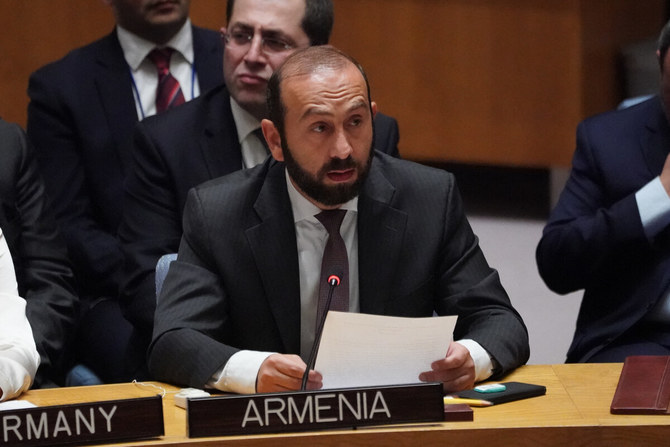NEW YORK: Armenia’s foreign minister has condemned the UN Security Council for failing to prevent what he described as the beginning of ethnic cleansing of Armenian populations by Azerbaijani forces in the mountainous Nagorno-Karabakh region.
Ararat Mirzoyan’s comments came on Thursday as he addressed a special session of the Security Council, on the sidelines of the 78th session of the UN General Assembly, two days after Azerbaijan launched a military offensive in the region that its Defense Ministry described as an “antiterrorist” operation. It followed the deaths of two civilians and four police officers in incidents involving landmines allegedly placed by Armenian armed forces.
Challenging the assertion by Azerbaijani authorities that the aim of the operation is to combat terrorism, Mirzoyan said it was a “large-scale invasion … in blatant violation of international law” that has left hundreds of ethnic Armenians dead, injured or missing.
He added: “The intensity and cruelty of the offensive makes it clear that the intention is to finalize ethnic cleansing of the Armenian population of Nagorno-Karabakh. Outcomes of this large-scale military operation clearly revealed the atrocious nature.
“There were clear signs this was coming and we have been raising the alarm about it for a long time now, but the international community refused to take it seriously.”
Internationally recognized as part of Azerbaijan, Nagorno-Karabakh is an ethnic Armenian enclave that has long sought independence from its parent state, sparking two wars between Armenia and Azerbaijan since the 1990s.
Azerbaijan seemingly scored a decisive victory in the second of those conflicts, in 2020, when it regained control of the region, before a Russian-brokered ceasefire paused hostilities. In May this year, Armenia’s Prime Minister Nikol Pashinyan conceded that Nagorno-Karabakh was part of Azerbaijan and recognized its sovereignty there.
In December last year, government-backed Azerbaijani protesters blocked the only road connecting the enclave with Armenia, preventing food and other essentials items from reaching the region and causing causing what the UN described as a humanitarian crisis.
In response to this, the International Court of Justice issued a preliminary ruling ordering the government to “ensure unimpeded movement” on the roads.
Mirzoyan told the Security Council: “This council, as an august body meant to ensure the implementation of court orders, failed to react adequately when the International Court of Justice adopted legally binding orders and they were disrespected by Azerbaijan.
“When in April, Azerbaijan installed illegal checkpoints and later started to kidnap people, the international community again failed to undertake adequate measures. When Armenia raised the alarm, the international community reacted to our warnings with skepticism.”
Azerbaijan’s foreign minister, Jeyhun Bayramov, told council members that the Armenian perspective on events was in defiance of the UN’s own principles of respect of sovereignty and territorial integrity.
The UK’s minister of state for the Middle East, North Africa, South Asia and the UN at the Foreign, Commonwealth and Development Office, Tariq Ahmad, called for a halt to all military action and a return to the negotiating table, and urged the UN to support efforts to address the immediate humanitarian needs in the region.
“While we fully recognize issues of sovereignty and territorial integrity, military might cannot be used to resolve tensions between communities,” he said. “Direct dialogue is the only way to find genuine, sustainable peace, genuine sustainable solutions.
“It is therefore now vital that talks resume with representatives of the Armenians on the basis of a credible plan to ensure the rights and security of everyone in the region, and to allow them to live in peace.”
UN Secretary-General Antonio Guterres called for strict observation of the 2020 ceasefire agreement. Miroslav Jenca, the assistant secretary-general for Europe, Central Asia and Americas at the UN Department of Political Affairs, highlighted the need to protect the civilian population of the region and said that ensuring their essential needs are met, including the preservation of their human rights, is the overriding priority.
“A genuine dialogue between the government of Azerbaijan and representatives of the region, together with full engagement in the normalization process by Armenia and Azerbaijan, are the only sustainable way forward,” Jenca said.


















